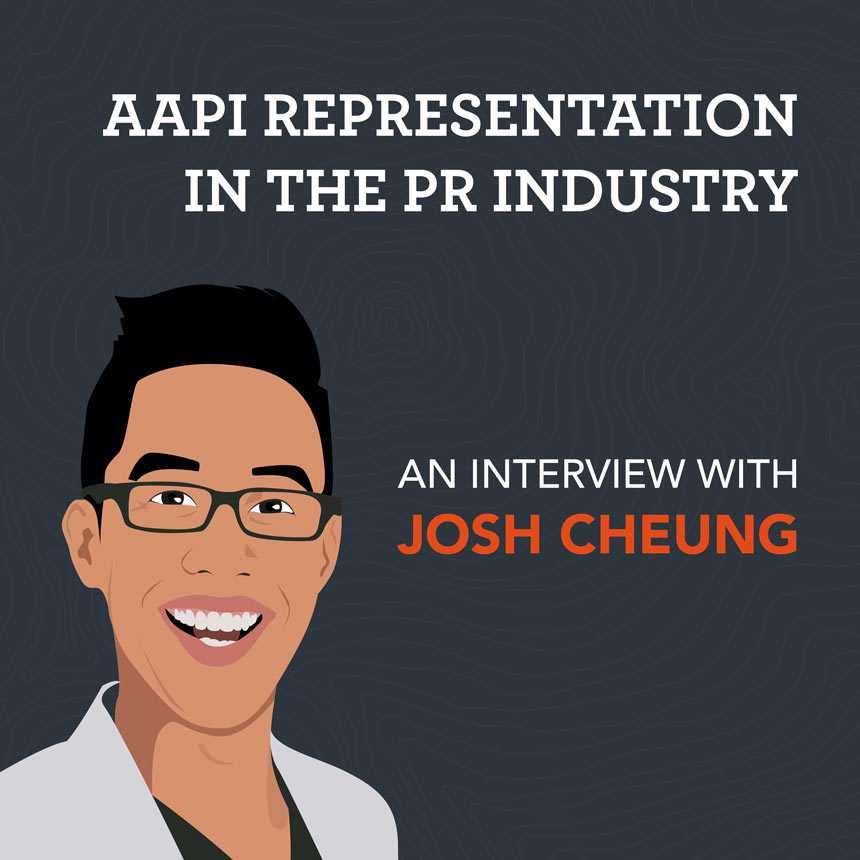

While Asian American and Pacific Islander (AAPI) heritage month might be drawing to a close, it’s essential that acknowledgement, discourse and celebration around AAPI identity and community continue to contribute to societal progress toward increased understanding and inclusion. This is particularly relevant in the professional realm, in which many business sectors and leadership roles still lack adequate representation from the AAPI community.
With this in mind, we sat down with Josh Cheung, creative director based in APCO Worldwide’s Washington, D.C., office, to discuss his experience and perspectives as an Asian American in the PR industry. Although he admits he never thought he’d end up working in the industry, working nearly 15 years in communications has reinforced to him that more diverse perspectives and representation are needed within the industry to make our work better and more meaningful for the multidimensional audiences to whom we seek to appeal. And whether or not you’re a PR pro, his commentary yields some noteworthy reminders for us as communicators, colleagues and humans.
Grace: Tell us about who you are and what you do.
Josh: I’m a proud first-generation Chinese American. My parents were born in Hong Kong and immigrated to America, settling down in Boston. That’s where my sister and I were born—so we’re the first generation of our family to be born in America. As for what I do—because talking about exactly what I do and our industry can get wonky really quickly—I generally just say that I create things, like ads, campaigns, videos and experiences, to inspire knowledge, understanding, empathy and action around a particular issue or cause.
Grace: That’s a pretty accurate and succinct way to sum up what you do. So how did you end up working in PR?
Josh: I tell a lot of people this, but I never thought I’d end up working in the PR industry. My parents never pushed me toward a particular career path, but I’ve always been interested in communications, even though I never knew the field to be one with many people like me—men of Asian descent. I eventually found my way into PR through a less traditional path—through visual design. And I think design, as well as my Chinese American upbringing, have really helped shape how I approach my work and counsel clients.
Grace: That’s interesting. Tell us more about how your upbringing, and design, have influenced you professionally.
Josh: Empathy is a fundamental basis of good design because you have to understand the needs and expectations of those who will interact with what you’re creating in order to design something that they’ll be able to easily and effectively use. Empathy entails listening to others and embracing a more selfless mindset and these values were what my parents instilled in my sister and me. I think, particularly in eastern cultures, there’s a huge emphasis on living in harmony with your neighbors and taking care of each other within your community. These cultural values, along with others like respect, politeness and diplomacy, have helped shape my belief that communication is not about having the loudest voice but is about also listening with purpose. And listening is something that we as communicators need to do more of, particularly now with where we are as a country and world.
Grace: Your call for communicators to listen more is very valid, and we know that change needs to start from within. So when it comes to the communication and PR industry itself, are there any shortcomings you see that should be addressed?
Josh: When we look at the numbers, people of Asian descent are among the least-represented groups working in the PR industry. So I think there’s an opportunity for us who are a part of the AAPI community and working in the industry to really demonstrate the value of the work we do and, overall, to highlight the power and influence of communication. We need to show how it actually benefits everyone if the industry reflects the audiences that it seeks to appeal to. This way, anything from news coverage, to ad campaigns, to corporate statements will then hopefully be presented in a way that takes into account the unique experiences and perspectives that we share as people of the AAPI, BIPOC, Hispanic and other underrepresented communities. After all, the more diverse and inclusive our industry is, the more nuanced and resonant our messages are likely to be.
Grace: This is a great point. And in our day-to-day work in PR, how can we be better allies to support AAPI professionals?
Josh: In my experience working in PR, I’ve noticed the voices that are loudest and quickest to respond are often the most heard and, perhaps, most respected ones. There’s almost an expectation that we should assert our opinion and perspectives as a given in all circumstances. As someone, along with many in the AAPI community, who prioritizes the cultural value of listening first, I’ve learned the importance of creating space for people, whether AAPI or not, to express themselves in their own way, even if it isn’t loud and quick—embracing the fact that different people have unique ways of articulating their perspectives. And I think this is something we can all keep in mind: just because some voices might be softer and slower to respond, they’re still valid to consider. So, let’s be inclusive and let’s seek out every voice and give them a chance to contribute!
Grace: Yes, let’s! And as you hinted in your response, let’s broaden this out a bit. How can the AAPI community show solidarity with other underrepresented groups?
Josh: Asian Americans, in general, have somewhat of a peculiar duality in America. On the one hand, we’re not white so are counted as minorities. But on the other hand, we’re perceived as having access to education and economic resources that are associated with social mobility. So for me, this means acknowledging not only the unique position we’re in—but also the responsibility we have to lift each other up. We should take what we know about being discriminated against and draw upon that to empathize with our brothers and sisters who are marginalized. And we should utilize the trust we’ve gained among those in power to elevate and support our brothers and sisters who are underserved. In our culture, there’s a huge emphasis on taking care of each other within our community. And here, we, as AAPI, BIPOC, Hispanic, and all other underrepresented groups, are our community.
APCO Alumna Grace Boyle conducted this interview.


